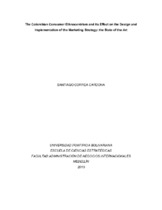The Colombian consumer ethnocentrism and its effect on the desing and implentation of the marketing strategy : the state of the art
Fecha
2015Autor
Correa Cardona, Santiago
Director/Asesor
Parente Laverde, Ana María
; Asesora.Vélez Ángel, Ligella Tatiana
Tipo de contenido
other
Citación
Metadatos
Mostrar el registro completo del ítemDocumentos PDF
Resumen
The increased competition derived from the globalization of business and markets, makes a set of products from both domestic and foreign origin available to the consumer at the same time (Netemeyer, Durvasula and Lichtenstein, 1991). However, the preference towards these products may vary from country to country, which has led to the development of different measures to assess consumer’s attitudes toward both domestic and foreign products (Netemeyer et al., 1991) and create effective marketing strategies that enable one to cope with such attitudes. One of these measures is the consumer ethnocentrism, which was first set out by Shimp and Sharma (1987) as a set of tendencies that may explain why consumers prefer domestic products over foreign ones; they also developed an instrument called the CETSCALE to measure consumer ethnocentric tendencies. Since then, the CETSCALE has been used to assess consumer ethnocentrism in different countries and to make assumptions about the marketing implications it can have.
Palabra/s clave
Globalización; Mercadeo; Consumidores; Estrategias de mercadeo; Psicología del consumidor.
Colecciones
- Trabajos de grado [6440]
El ítem tiene asociados los siguientes ficheros de licencia:


